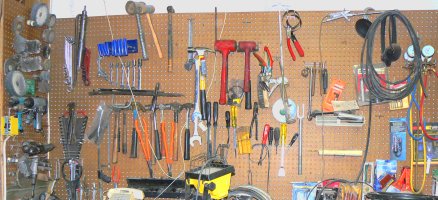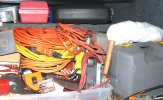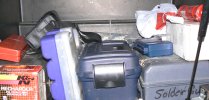Are these tools necessary?

For every RV owner there is always the question of how many and which tools should I keep in my RV. The question becomes even more complicated when you consider becoming a fulltimer. It gets even more difficult when you consider the differing skill sets of RV owners. I have also been asked to make up a special list of tools for the ladies, but since I know a lady who is a retired aircraft mechanic who's mechanical skills far exceed mine, and also a male who retired from business and who is not comfortable holding a screwdriver, I really think that gender has very little to do with the question.
A Basic List..
I think that everyone should have at least a few basic tools and repair items, even when skills are very weak. One of the most important maintenance chores on all RVs is to keep things tight. That means that you must have a set of screwdrivers. Look around your RV and examine the heads of the screws that you find and make sure that you have a tool to tighten all of them. That usually means at least two sizes of flat slot and Phillips head, and usually a pair of square drive or Robertson screwdrivers. Don't buy the cheap ones! My screwdrivers are either Stanley or some other major brand name. It may also be helpful to keep each of the most common ones in a very short, or "stubby" version as well for tight locations.
I would also suggest a pair of slip joint pliers, a 4" and a 8" adjustable wrench, a pair of locking pliers (such as Vice Grips), a claw hammer, a pair of water pump pliers, a staple gun, and some type of small clamp. (I keep a "C" clamp.) I also suggest a small saw for wood and one for metal. With those tools you should also keep a roll of duct tape, some spray lubricant, and some glue.
Those items are things that even the least mechanical are likely to at some time wish that they had. You may be amazed by what they will save you. We all hang a picture, tighten a loose hinge or fix a simple light from time to time and it only takes one repair to save more than the cost of such items.
A More Extensive list for the average owner....
Most RV owners will at times find a need for a good set of combination wrenches. RVs have very little by way of metric hardware but modern chassis have both types so a set of inch and of metric is a good investment. That same thing is true of sockets. I have a combination set of 1/4" drive and another of 3/8" drive in both metric and inches and they range from 3/16" to 1 1/2" in sizes. Unless you are a serious mechanic there is probably no need for the larger sizes of wrench or of socket.
I carry a filter wrench(oil filters), and a strap wrench in two sizes. I have both a small and a medium size ball-peen hammer. A hack saw is an item that may not be used often, but it can be very important.I have and additional adjustable wrench in a 12" size, two large "C" clamps, and a grease-gun(for lubrication of my chassis). I carry three sizes of slip joint pliers, 4", 8" and 12" as well as water pump pliers. Don't forget to put in a center punch, an alignment punch and a couple of cold chisels. Two sizes of file are also important.
A caulking gun will be useful.
Electrical tools......
This is an area where I probably carry more than most RV owners, because it was my field when I was working. Let me say that every RV owner should have a medium quality volt/ohm meter and take the time to learn how to use it. At the minimum, you need to lean how to check the power pedestal before you connect your RV to make sure that it is safe. Unsafe power in RV parks is all too common. I suggest a digital meter in the $30 price range is sufficient for all that most RV owners will ever need. I actually carry a much more capable meter from John Fluke Company and one that costs well over $100 but that is because I had one at work and convinced Pam that Santa should bring me one when I retired.
In addition, you should have at least one pair of needle nose pliers, a pair of dikes, wire strippers with crimping tool, an assortment of connectors, electrical tape, a soldering iron, and some electrician's pliers. I carry two pairs of clip-on jumper leads, a 12V test light, and alligator clips for my meter lieads.
If you have room, a soldering gun is also very usefull as well some of the mini needle nose pliers, mini dikes and a pair or two of locking forceps(can be found in any electronic shop). Don't forget some solder also!
Power tools........
Every RV owner should have at least an electric drill. While the rechargeable ones are most convenient, they can have the disadvantage of always being discharged when you need them. For that reason, mnay owners carry a corded drill because they don't use it often and it is always ready when they are. I actually have one of each. Don't forget that a good set of drill bits is vital. I keep one of the sets that have the flats on the drive end which makes them much more secure in the modern key-less chucks.
I also suggest that each owner should have some type of air compressor that is capable of inflating the tires on both the RV and tow vehicle or towed vehicle. The 12V type are very good for keeping in a vehicle, but for use in the RV park, or where you have 120V power available, the 120V type are far faster and more reliable. I used a Black & Decker, Air Station for years and it is an excellent tank-less compressor. Sears also makes a good one. Currently, I carry a small tank type compressor(two gallon) because it is useful for many things other than airing up tires. If you get one of those, make sure that you look to see at what pressure the compressor turns both on and off. The restart pressure is vital because if your tires require more pressure than the restart setting, it becomes very difficult to inflate them properly.
Do not forget that power tools require power cords. I keep several of them in different lengths. Be sure to keep your cords in good condition for safety and reliability. These cords are another of the items which pay to get quality brand name items.
Additional power tools will depend a great deal on skill sets, but one item that I think most average RV folks would find very useful is a Dremmel or similar tool. I have one that I seem to use more frequently as time goes along. They are small and can be used in very tight places, and the list of available tools for them is very long. I keep metal cutting, grinding stones, wood cutting, drill and router tools for mine. It is probably one of the most used power tools that I own.


Wood tools......
For most folks, just a few very basic tools here are probably enough. A drill was already mentioned, as was a hammer. Some small wood clamps are helpful at times. A coping saw or some other small saw that can cut curves is frequently handy and weighs very little. A short combination saw for projects is very handy and a square is vital. I have both a tri-square and a carpenter square. A medium sizel bubble level is worth some space. Since I do some hobby wood working I also carry a rechargeable circular saw large enough to cut through a 2X4 and a power sander. For projects it is very helpful to have a jigsaw along and just to indulge myself, I also have my scroll saw with me. A few select wood chisels and a mallet are nice to have.
I have a wood rasp, a small block plane, an auger and bits, several sizes of hole saw, a counter sink, a nail set,a reamer,rat-tail files, and four 2' bar clamps. I have several wood scrapers, a putty knife,and a miter box & saw. As a hobbyist, I find a profile sander to be a very handy tool, but don't recommend it to most RV owners.
Some guidelines......
Keep in mind that most tools are very heavy. Do not carry tools that you will never use and only vital ones if they are rarely used. If you spend a great deal of time in the same locations, consider what may be available to you where you stay so you won't need to carry your own. Most of us start with more tools than we should. I have stored some of my tools with my sons on the condition that if I change my mind I can retrieve them but while there the son is welcome to use them.
When locating your tools in the available storage space, keep in mind to balance your load. If all tools are placed to one side, some other heavy items should be on the other. Our motorhome happens to be curb-side heavy, so putting all of my heavy tools to the street side actually improved the load distribution. It is important that you know the weights of each axle and of each side before and after you load your belongings into the RV. The best answer is to get individual wheel weights if possible.
What I did was to go through a truck scale that gave each axle weight, two times. The second trip I kept the right side wheels off of the scale pads to weigh only the left side. If you do this, try to center the wheels that you are weighing on the pads. Not all scales will be located so that this is possible. I found a truck stop where I was able to do this, both before and after loading our belongings. Simple subtraction gave me the right weights. You can get a good estimate of what weight you will be adding by putting things into boxes and using a bathroom scale to see just what they weigh.

